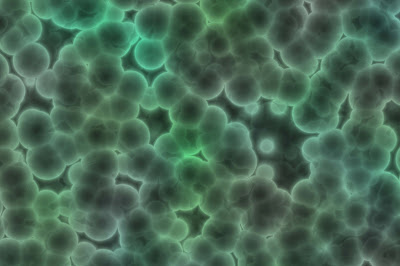
| Photo by Jayanta Behera |
The Inside Story
Science is just beginning to learn which bugs inhabit our bodies and how vitally important they are to being healthy.
In a healthy, balanced gut (aka gastrointestinal tract) you'll find:
- 100 trillion microbes
- 85% good bacteria and 15% bad
- 10,000 different kinds of bacteria
- 10 times more bacterial cells than total body cells
- 95% of the genetic material of your body is NOT yours!
Bacteria are active participants in life-processing functions of the
body: metabolizing food, releasing vitamins and breaking down toxins.
Most important, they are key to a robust immune system and it's ability to fight infection and disease.
Recent studies at the University of Pennsylvania show that mice grown germ-free or on antibiotics are less able to fight infection. This same effect can be seen in people who often get secondary infections after a long course of antibiotics.
The Outside Story
On another level, antibacterial soaps, cleaners and hand-wipes are everywhere (except in my household). American's obsession with hygiene not only affects the body's ability to fight infection, but may cause it to turn on itself. There has long been suspicion among medical researchers that the rise of autoimmune disorders such as asthma could be promoted by the sterility of our homes compared to when we lived less concerned about germs.
Diversity Is a Gut Instinct
Our gut community of microorganisms is crucial—the more diversity the healthier we are. Gut makeup is determined by age, where we live and diet. We cannot be whole without a diverse and vast array of microbes swimming around inside and crawling around outside. It's what keeps us able to fight off disease and avoid the onset of the many autoimmune disorders now plaguing our health system.
A recent study in the journal Science found that the presence of bacteria on the skin offered another immune protection than what's provided by the gut. Bacteria on your skin protects you from infection AND even allergies. Your skin is a first line of defense for infection. We've also learned that gut bacteria and skin bacteria communicate in some way to provide effective defenses.
Breaking It Down
Here's 8 tips on how to optimize and protect your microbial community:
- Clear your house of antibacterial products
- Take a probiotic
- Eat more raw foods
- Add cultured and fermented foods to your diet
- Consume only meat and dairy from grass/organically-fed animals labeled as antibiotic-free
- Avoid fructose and sugar—it wrecks havoc on your immune system
- Don't take antibiotics unless you have a bacterial infection
- Get outside—get your hands dirty and plant a garden
- 80% of all antibiotics produced are used in agriculture. So even if you're not taking antibiotics, you may be exposing yourself to antibiotics by what you are eating.
- Knowing that antibiotics are used to produce heavier animals for market, scientists are finding a possible link between antibiotic use and risk of obesity in children.
- Interest is increasing in the role of prebiotics, indigestible food ingredients that provide no nutrition to people, but provide nourishment to the friendly bacteria living in the gut.
- If prebiotics are food for friendly bacteria, then sugar and processed foods are the fuel for bad bacteria.
- The key factor behind cancer appears to be ecological rather than genetic.
If you want to learn more about the process of fermenting foods and Gut and Psychology Syndrome (GAPS) Nutritional Program check out this series of videos, an audio interview with Dr. Natasha Campbell-McBride.
Now that you know you harbor a veritable zoo inside your body, one
that's essential to your health and being disease-free (raise your hand
if this is news to you...), shouldn't you be feeding it well?
Take heed for your own health and spread the word. Use the share tabs
below this post to tell your friends about this very important health
information.
Lots of stuff to chew on in this post. Fire away with the questions. You surely have many. What did you find most compelling in this post?






0 komentar